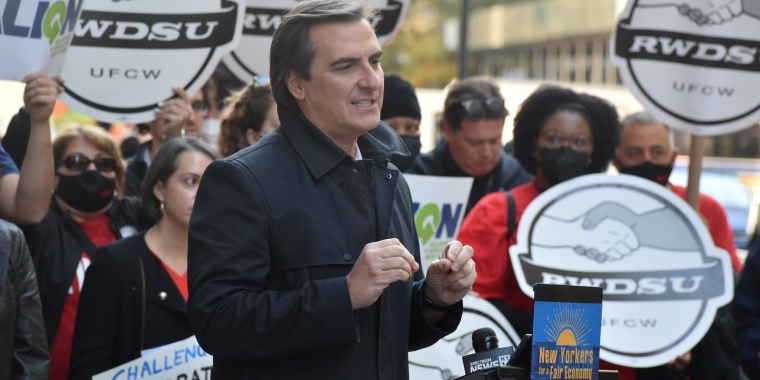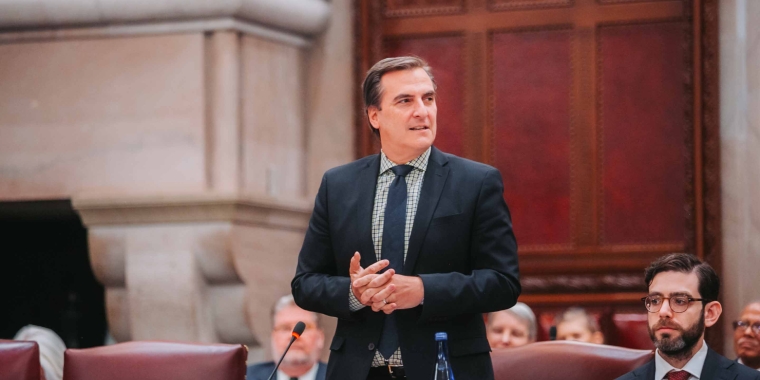
The American Prospect: The Anti-Monopoly Fight Will Be in the States

Rising consumer prices, reduced worker power and lower wages, clogged ocean ports, baby formula shortages, and higher health care costs are symptoms of a larger problem: corporate concentration. Antitrust advocates are pushing for elected officials to make fighting corporate power a priority, and the public seems to agree with them.
A majority of Americans have been “somewhat dissatisfied” or “very dissatisfied” about the size and influence of major corporations for two decades, with the share of “very dissatisfied” more than doubling, from 17 percent in 2002 to 42 percent in 2022. Meanwhile, market concentration has been on the rise, with the number of annual corporate mergers increasing almost sevenfold between 1985 and 2020.
But with federal antitrust legislation looking increasingly unlikely in the near term, as David Dayen reports, the main battles against concentrated corporate power may play out in the states.
Today, Fight Corporate Monopolies (FCM), a nonprofit dedicated to promoting antitrust enforcement, announced a task force with an initial cohort of eight elected officials from four states: Delaware, Illinois, Pennsylvania, and New York. It aims to create a community of anti-monopoly policymakers, provide them with resources for research and messaging, connect them with adversely affected constituents and small-business owners, and even help draft legislation to restrain the power of large corporate actors.
The task force can be seen as a counterweight to conservative organizations like the American Legislative Exchange Council (ALEC), a corporate-sponsored outfit that supplies model legislation on a host of right-wing causes to state legislatures. In a small way, the FCM task force can do the same for the cause of preventing corporate corruption and monopolization.
“All these task force members really have a deep record of championing legislation that has stood up to concentrated corporate power and are currently sponsoring new legislation that protects workers and local businesses from abuses of dominant corporations,” said Helen Brosnan, FCM’s executive director, in an interview with the Prospect. She sees the task force as a space for these anti-monopoly advocates to trade ideas and strategize, and predicts political strength because the issue has salience across class, racial, and ideological divides.
“I already had concerns about what essentially is corporations benefiting from the tax dollars of working-class Black and Latino families,” explained task force member and Illinois state Sen. Rob Peters, who was drawn to the work of FCM as a way to protect his constituents from corporate exploitation disguised as economic development.
Market concentration has been on the rise, with the number of annual corporate mergers increasing almost sevenfold between 1985 and 2020.
Peters is the chief sponsor of the Honesty in Economic Development Act, which would largely ban nondisclosure agreements between Illinois state and local governments and the companies they contract, which aligns with an FCM-sponsored initiative called “Ban Secret Deals.” Peters was also instrumental in passing the Fair Food and Retail Delivery Act, which protects restaurants from third-party apps using logos and listing menu items of restaurants without permission.
FCM, along with its sister organization the American Economic Liberties Project (AELP), has worked with members of the task force on many of their state-level policies already. Pat Garofalo, director of state and local policy at FCM and AELP, told the Prospect that the 21st Century Antitrust Act in New York is the “biggest and most groundbreaking” legislation that FCM has worked on. The bill, if passed, would drastically lower the threshold for antitrust enforcement and allow class action lawsuits for antitrust violations, among other provisions.
Michael Gianaris, a task force member and the deputy majority leader in the New York State Senate, is the lead sponsor of the bill. The bill has passed the New York Senate twice, but has yet to crack the Assembly, a problem that FCM is working on, said Garofalo. Gianaris was also instrumental in successfully fighting Amazon’s installation of a second headquarters in Queens, New York.
In Pennsylvania, FCM worked with Pennsylvania House Democrats on a suite of bills, including an anti-price-fixing act and antitrust reform. Task force members Nick Pisciottano and Sara Innamorato were leaders in the Pennsylvania House of Representatives on the Stop Price Fixing Act and the Pennsylvania Open Markets Act, which in tandem would empower the attorney general to investigate and prosecute antitrust violations and protect whistleblowers with inside knowledge of price-fixing schemes.
Though anti-monopoly lawmakers across different states often promote similar progressive measures, Garofalo said there was no prescriptive policy set that task force members had to sign for entry into the group. “The connecting thread is viewing the world in a certain way, and viewing these problems in a certain way and being and feeling empowered to step up and have your state do something about it,” explained Garofalo, who also emphasized the importance of allowing lawmakers to tailor solutions to their states.
“States can do all sorts of creative, innovative things, to check corporate power and to bring more accountability to the ways in which corporations are abusing both workers and local businesses … [Policies are] going to be different in Illinois versus Pennsylvania versus New York versus Delaware.”
Interest in state anti-monopoly solutions has grown of late. An extensive tool kit for strengthening state antitrust laws and establishing public options was released earlier this year. The groundbreaking sectoral bargaining council for fast-food workers in California, just signed into law this week, enables the state to create a system that would be seen as an anti-competitive cartel if put in place by private actors. Several fast-food firms have forced workers to sign noncompete agreements restricting them from working at other outlets, which suppresses wages and stifles worker freedom of movement. The California fast-food council takes the opposite approach, using its power for the collective good of the workers. It could be used as a benefit for small businesses dealing with monopoly vendors, or other purposes.
FCM and the task force members hope that new members will sign on over time, as the task force delivers on policy, and provides a basis for cooperation across states. “My hope is that this grows because we need to move away from where states are pitted against each other, where Illinois and Wisconsin are in this race to the bottom around economic development,” said Peters. “The only way we can actually avoid that is by creating a broad enough coalition of state legislators across the country.”
Along with the elected officials previously mentioned, Delaware Rep. John Kowalko, Pennsylvania Sen. Katie Muth, and New York Assemblymembers Emily Gallagher and Anna Kelles are also members of the task force.



